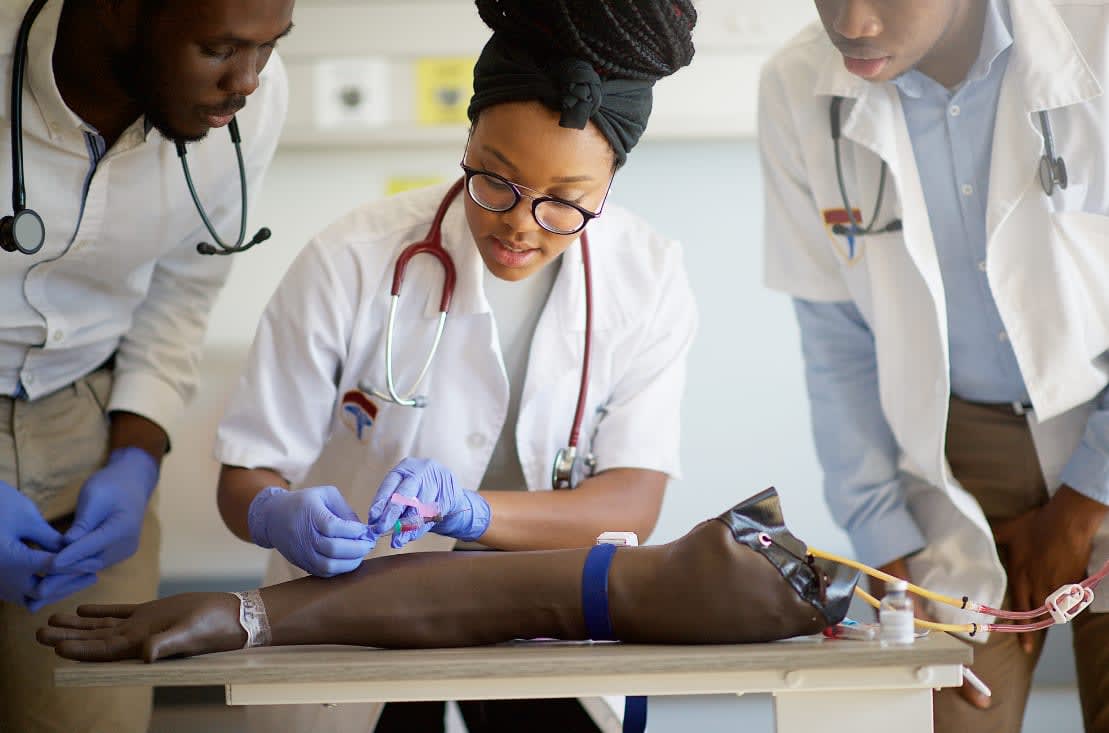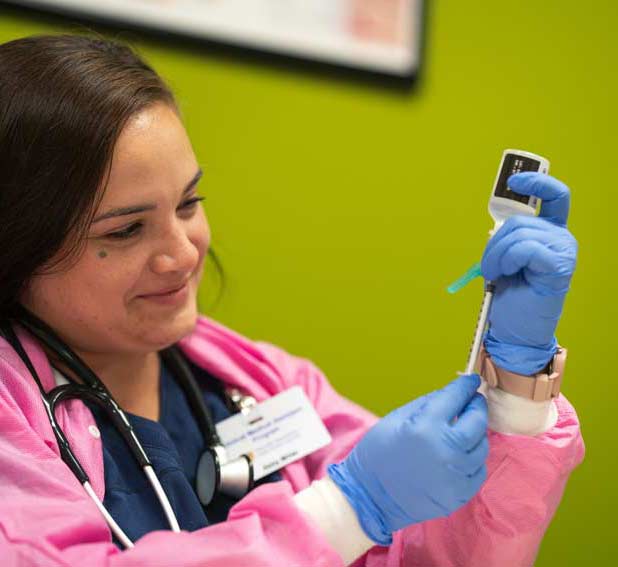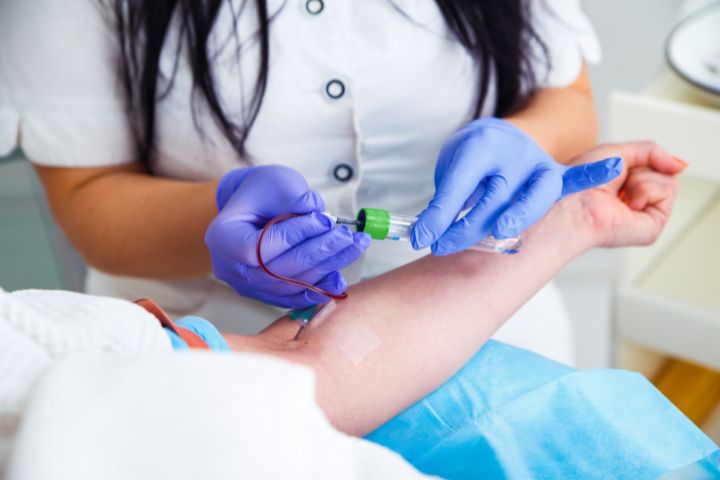How a Phlebotomy Training Course Sets the Stage for a Successful Healthcare Career
The Course to Qualification: Recognizing the Phlebotomy Educating Course Journey and Its Importance
As you think about the path to certification in phlebotomy, it is very important to comprehend the function you'll play in health care. Your training will certainly cover necessary abilities, from blood collection methods to patient communication. Each element of the program prepares you for the difficulties ahead. However just what does the journey involve, and why is certification so essential for your future profession? Allow's explore these concerns better.

The Duty of Phlebotomists in Health Care
Phlebotomists play an essential duty in the health care system, acting as the crucial link in between clients and crucial diagnostic screening. You'll carry out blood draws, ensuring samples are accumulated precisely and securely. Your competence helps in identifying clinical conditions, monitoring wellness, and leading treatment choices.
In your daily communications, you'll require to establish depend on with people, making them really feel comfortable during what could be a stressful experience. You're accountable for classifying and handling samples meticulously to stop contamination or errors, which could influence examination results.
Past this, you'll usually function along with medical professionals and nurses, communicating vital info regarding clients' conditions. By grasping your skills, you contribute meaningfully to patient treatment, making you an essential part of the clinical group.
Review of Phlebotomy Training Programs
When discovering phlebotomy training programs, you'll discover various kinds made to fit various routines and discovering styles. Each program helps you create crucial abilities like blood collection and individual communication. Understanding these options is essential to choosing the best course for your job.
Kinds of Training Programs
A number of types of training programs are offered for those looking to come to be skilled in phlebotomy. In addition, some medical facilities and facilities offer on-the-job training programs, offering sensible experience while you learn. Whatever course you pick, each program aims to furnish you with the needed abilities for a successful phlebotomy occupation.

Trick Abilities Developed
Mastering phlebotomy needs a set of essential skills that are established through extensive training programs. You'll learn technological abilities like proper vein selection, needle insertion, and blood collection techniques. These hands-on techniques assure you can execute procedures safely and effectively. Furthermore, communication skills are fundamental; you'll require to communicate with individuals, describe procedures, and put them at ease. Understanding anatomy and physiology is crucial, too, as it aids you situate capillaries and comprehend the body's reaction to blood draws. You'll acquire knowledge of safety methods and infection control, guaranteeing you maintain a sterile setting. Each of these skills is important for your success as a certified phlebotomist, making you a valuable possession in any medical care setting.
Trick Components of a Phlebotomy Program
In a phlebotomy course, you'll focus on crucial subjects that prepared for your future profession. You'll involve in hands-on training that allows you to apply what you have actually learned in real-world settings. Both the core educational program and useful experience are crucial for your success as a phlebotomist.
Core Curriculum Summary
While seeking a phlebotomy training course, you'll experience a curriculum designed to furnish you with essential abilities and knowledge. Phlebotomy Courses Near Me. This curriculum normally consists of anatomy and physiology, concentrating on the circulatory system and comprehending blood parts. You'll also learn more about various kinds of blood collection approaches, consisting of venipuncture and capillary puncture techniques
Additionally, infection control and security procedures are crucial parts, ensuring you recognize just how to keep a sterile environment. You'll study patient interaction, emphasizing communication and empathy, which are crucial for alleviating individual anxiety. Finally, ethical and legal considerations will certainly be resolved, preparing you for real-world responsibilities. This fundamental expertise will certainly allow you to succeed as a phlebotomist and supply high quality care in medical settings.
Hands-On Training Experience
Getting hands-on experience is a vital component of your phlebotomy training course. This sensible training permits you to apply what you have actually found out in a real-world setting, enhancing your skills and self-confidence. Phlebotomy Courses Near Me.
In addition, you'll get the chance to communicate with clients, which is important for developing your interaction skills. This combination of technical effectiveness and interpersonal abilities is vital for your success as a qualified phlebotomist. Ultimately, hands-on training is where concept satisfies technique, strengthening your knowledge and readiness for accreditation.
Qualification and Licensing Demands
Prior to you can start your profession in phlebotomy, it is important to comprehend the accreditation and licensing demands that differ by state. Most states require phlebotomists to hold an accreditation from an acknowledged company, such as the National Phlebotomy Association or the American Society for Scientific Pathology. These accreditations usually include passing an exam that checks your understanding and abilities in the area.
Along with qualification, some states have certain licensing demands. You might require to finish a specific variety of hours in professional technique, send evidence of training, or go through a history check. It is necessary to research your state's policies to see to it you satisfy all required standards.
Staying informed concerning these demands not only aids you secure a position yet additionally improves your trustworthiness as a professional. By satisfying these requirements, you'll be well on your means to an effective occupation in phlebotomy.
Hands-On Training and Practical Experience
Hands-on training and sensible experience are necessary elements of your phlebotomy education and learning, as they enable you to use theoretical knowledge in real-world circumstances. Throughout your training, you'll participate in supervised venipuncture, find out appropriate strategies, and become aware of various blood collection tools. This straight involvement is important for constructing your self-confidence and honing your skills.
You'll websites work very closely with skilled experts that can guide you through the subtleties of individual interaction and sample handling. Each practice not just enhances your understanding but likewise prepares you for the busy setting of medical care setups.
Furthermore, numerous programs integrate scientific turnings, enabling you to experience varied setups, from hospitals to outpatient centers. This exposure aids you adjust to various challenges and individual needs, guaranteeing you're well-prepared for your future role. Accept these chances, as they're necessary to coming to be a proficient and thoughtful phlebotomist.
Difficulties Encountered During Training
While getting hands-on experience is crucial, it is very important to identify the challenges that can emerge during your phlebotomy training. You may encounter anxiety when executing treatments on real clients, especially if you're new to the environment. The stress to get everything right can be overwhelming. Furthermore, understanding the abilities needed for blood attracts takes practice; you may battle with method initially.
Time administration can additionally be a difficulty, as harmonizing theory, sensible sessions, and personal dedications can feel intimidating. You may encounter varying discovering rates among your peers, causing sensations of self-doubt if you believe you're falling behind. Lastly, adjusting to the different personalities of teachers can be difficult, as each may have an unique training design.
Acknowledging these obstacles early on can prepare you for success and help you establish resilience throughout your training trip.
Occupation Opportunities After Certification

As you get experience, you could also consider specializing in areas like pediatric or geriatric phlebotomy, accommodating details individual needs. Some phlebotomists select to advance their professions by coming to be laboratory technicians or going after additional education and learning in healthcare fields.
In addition, your accreditation can bring about functions in training or managing new phlebotomists, enabling you to share your expertise. With the health care sector constantly growing, your abilities will certainly constantly remain in need, leading the way for a secure and meeting career. Accept the opportunities waiting on you!
Frequently Asked Concerns
What Is the Normal Period of a Phlebotomy Training Program?
Phlebotomy training programs usually last around 4 to 8 weeks. You'll take part in hands-on technique, class guideline, and online understanding. Completing this training prepares you for accreditation and a satisfying profession in health care.
Are Online Phlebotomy Courses Available?
Yes, online phlebotomy courses are offered. They provide flexibility and benefit, permitting you to study at your very own speed. Simply validate the program is approved to fulfill accreditation needs and obtain valuable abilities for your job.
How Much Does Phlebotomy Training Typically Cost?
Phlebotomy training typically costs in between $700 and $2,500, depending on the program and area. You should think about elements like training course size, consisted of products, and hands-on experience when picking the ideal training for you.
What Are Usual Requirements for Phlebotomy Training?
Typical prerequisites browse around here for phlebotomy training often consist of a high college diploma or GED, immunizations, and a background check. Some programs might additionally call for fundamental medical care understanding or certifications, guaranteeing you're gotten ready for hands-on training.
Can I Work While Finishing My Phlebotomy Training?
Yes, you can work while finishing your phlebotomy training. Several students equilibrium tasks with their research studies, however make specific to manage click resources your time successfully to assure you satisfy both work and training commitments efficiently.